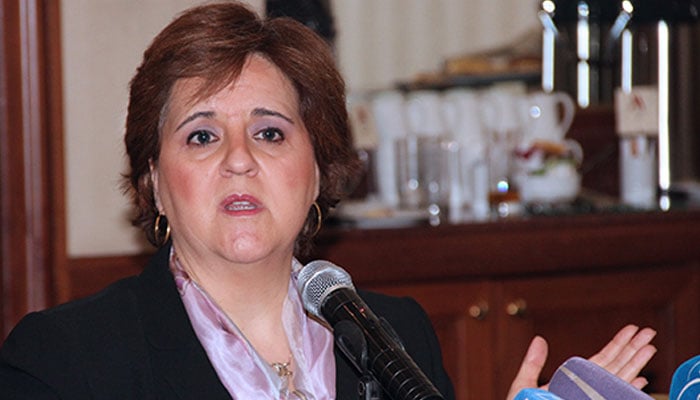Going forward in COVID-19 times: Pakistan has not so far applied for debt relief from G20 countries
ISLAMABAD: Pakistan has not so far applied for debt relief from G20 countries as neither Islamabad nor any other country made any formal request to this effect, said IMF’s Resident Chief Teresa Daban Sanchez on Monday.
“The G20 announcement regarding debt relief is a bit complex and unclear, so the IMF is reviewing its details. The countries will have to apply for debt rescheduling and so far none of the countries, including Pakistan, have applied for it," the IMF’s Resident Chief in Pakistan, Teresa Daban Sanchez, said while speaking at an online dialogue arranged by the Sustainable Development Policy Institute (SDPI) here on Monday.
Regarding the construction package announced by the government, she said that it should be temporary, aimed at kick-starting economic activities. She said that Pakistan was performing well under the IMF program during the pre-COVID-19 situation. Regardingautonomy to the SBP, she said that it should be brought in line with international standards but she would not plunge into supporting any specific idea at this moment.
She said that the inflationary pressures would continue to persist as inflation was projected to remain in double digits in the range of 11.3 percent for the current fiscal year. She said that Pakistan’s GDP growth rate would turn into shrinking and negative mode for the current fiscal because of COVID-19 situation. Pakistan, she said, would have to utilize an additional Rs700 billion from its budget because of coronavirus and the country’s revenue would be decreased by Rs 900 billion.
Maria Teresa Daban Sanchez said that the performance of Pakistan’s economy prior to the emergence of Covid-19 was satisfactory. She said that the IMF was quite happy the way Pakistan was implementing different policies to achieve fiscal consolidation and macroeconomic stability and would continue to provide its support to the country to face the socio-economic challenges posed by COVID-19.
She noted that the IMFs assessment of the situation says that COVID-19 would reverse the decline in public debt that resulted from fiscal consolidation efforts. This would also result in increase of primary deficit.
She appreciated the Government of Pakistan’s decisive response to COVID-19, including cash transfers to most vulnerable families, lowering down policy rate, eliminating import duties on several items, and other initiatives to provide relief for the low income segments of society. Commenting on opening up of the construction sector, she said that IMF supports opening of labour intensive sector where daily wagers may be absorbed. However, she hoped that amnesty announced for investment in the construction sector is temporary in nature, and would be withdrawn once the situation becomes normal.
“The IMF recommends that Pakistan as well as other countries recalibrate their policy actions as we move on. Therefore, the regulatory measures taken are temporary and regulatory relaxation might not be necessary in the future as it can create problems,” she added.
She said that ongoing existing fund facility (EFF) program is very much intact. The IMF is working closely with the authorities in Pakistan and the next review mission may take place virtually. Regarding the EFF, she said, as the medium term economic outlook is changing, we have to recalibrate everything from targets to trajectories. However, we need to continue working on EFF as a framework as the program provides continuity along with a healthy and sustainable trajectory from an economic point of view. “It is encouraging that the GOP is committed to fiscal consolidation and reforms once the things get normal,” she added.
While commenting on the overall impact of Covid-19 on Pakistan’s economy, she said that there would be a significant cut in imports from Pakistan from various countries, the remittances would get reduced, tax collection would reduce considerably and the growth rate may get reduced to -1.5%. It is in this context, funds under the RFI arrangement would help Pakistan to bridge the gap in immediate financing needs.
“The IMF is working to make Pakistan as competitive and open as possible by making it more export oriented and an attractive destination for investment,” she added. Responding to a question, Ms Sanchez stated that IMF experts in Washington are trying to bring SBPs legislation in line with best practices as we have no bias for or against any person to chair the SBP’s board. It is purely the Government of Pakistan’s discretion.
Dr Abid Qaiyum Suleri, Executive Director, SDPI, while highlighting Pakistan’s recent engagements with the IMF, said that COVID-19 has brought socio-economic uncertainties with a lengthy period of emergency response that would result in global recession. This “new normal”, according to the UN, would be accompanied or followed by a severe food crisis. In these circumstances, multilateral lenders like the IMF would have to redefine their role as a socio-economic saviour to ensure “stability” of the “stability” that the IMF talks about.
“Among all deficits that Pakistan is facing today, trust deficit between people and the IMF, may also lead to trust deficit between people and the government, which Pakistan cannot afford during these testing times. The SDPI is continuously playing a positive role to bridge this deficit by bringing all stakeholders together for a candid discussion leading to greater transparency,” added Dr. Suleri.

Comments
Post a Comment